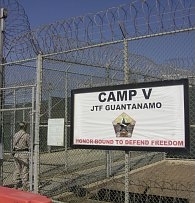
The Universal Declaration of Human Rights (UDHR) is an international document adopted by the United Nations General Assembly that enshrines the rights and freedoms of all human beings. It was accepted by the General Assembly as Resolution 217 during its third session on 10 December 1948 at the Palais de Chaillot in Paris, France. Of the 58 members of the United Nations at the time, 48 voted in favour, none against, eight abstained, and two did not vote.

Torture is the act of deliberately inflicting severe physical or psychological suffering on someone by another as a punishment or in order to fulfill some desire of the torturer or force some action from the victim. Torture, by definition, is a knowing and intentional act; deeds which unknowingly or negligently inflict suffering or pain, without a specific intent to do so, are not typically considered torture.

The Geneva Convention relative to the Protection of Civilian Persons in Time of War, more commonly referred to as the Fourth Geneva Convention and abbreviated as GCIV, is one of the four treaties of the Geneva Conventions. It was adopted in August of 1950. While the first three conventions dealt with combatants, the Fourth Geneva Convention was the first to deal with humanitarian protections for civilians in a war zone. There are currently 196 countries party to the 1949 Geneva Conventions, including this and the other three treaties.

The International Covenant on Civil and Political Rights (ICCPR) is a multilateral treaty adopted by United Nations General Assembly Resolution 2200A (XXI) on 16 December 1966, and in force from 23 March 1976 in accordance with Article 49 of the covenant. Article 49 allowed that the covenant would enter into force three months after the date of the deposit of the thirty-fifth instrument of ratification or accession. The covenant commits its parties to respect the civil and political rights of individuals, including the right to life, freedom of religion, freedom of speech, freedom of assembly, electoral rights and rights to due process and a fair trial. As of September 2019, the Covenant has 173 parties and six more signatories without ratification. Notable holdouts are People's Republic of China and Cuba. North Korea tried to withdraw.

An unlawful combatant, illegal combatant or unprivileged combatant/belligerent is, according to United States law, a person who directly engages in armed conflict in violation of the laws of war and therefore not protected by the Geneva Conventions. The International Committee of the Red Cross points out that the terms "unlawful combatant", "illegal combatant" or "unprivileged combatant/belligerent" are not defined in any international agreements.

The law of war is the component of international law that regulates the conditions for war and the conduct of warring parties. Laws of war define sovereignty and nationhood, states and territories, occupation, and other critical terms of international law.

The Convention against Torture and Other Cruel, Inhuman or Degrading Treatment or Punishment is an international human rights treaty, under the review of the United Nations, that aims to prevent torture and other acts of cruel, inhuman, or degrading treatment or punishment around the world.
Extradition is an action wherein one jurisdiction delivers a person accused or convicted of committing a crime in another jurisdiction, over to the other's law enforcement. It is a cooperative law enforcement procedure between the two jurisdictions and depends on the arrangements made between them. In addition to legal aspects of the process, extradition also involves the physical transfer of custody of the person being extradited to the legal authority of the requesting jurisdiction.

The Hague Conventions of 1899 and 1907 are a series of international treaties and declarations negotiated at two international peace conferences at The Hague in the Netherlands. Along with the Geneva Conventions, the Hague Conventions were among the first formal statements of the laws of war and war crimes in the body of secular international law. A third conference was planned for 1914 and later rescheduled for 1915, but it did not take place due to the start of World War I.

David Matthew Hicks is an Australian who attended Al Qaeda's Al Farouq training camp in Afghanistan, and met with Osama Bin Laden during 2001. He was then detained by the United States in Guantanamo Bay detention camp from 2002 until 2007.
International humanitarian law (IHL), also referred to as the laws of armed conflict, is the law that regulates the conduct of war. It is a branch of international law which seeks to limit the effects of armed conflict by protecting persons who are not participating in hostilities, and by restricting and regulating the means and methods of warfare available to combatants.

The Guantanamo Bay detention camp is a United States military prison located within Guantanamo Bay Naval Base, also referred to as Guantánamo, GTMO, and "Gitmo", on the coast of Guantánamo Bay in Cuba. By January 2021, 731 of the 780 people detained had been transferred elsewhere, 40 remain there and 9 had died while in custody.

Human rights are largely respected in Switzerland, one of Europe's oldest democracies. Switzerland is often at or near the top in international rankings of civil liberties and political rights observance. Switzerland places human rights at the core of the nation's value system, as represented in its Federal Constitution. As described in its FDFA's Foreign Policy Strategy 2016-2019, the promotion of peace, mutual respect, equality and non-discrimination are central to the country's foreign relations.
Security of the person is a basic entitlement guaranteed by the Universal Declaration of Human Rights, adopted by the United Nations in 1948. It is also a human right explicitly defined and guaranteed by the European Convention on Human Rights, the Constitution of Canada, the Constitution of South Africa and other laws around the world.

The United States Military Commissions Act of 2006, also known as HR-6166, was an Act of Congress signed by President George W. Bush on October 17, 2006. The Act's stated purpose was "to authorize trial by military commission for violations of the law of war, and for other purposes".
The nature of international human rights law has been seemingly altered by Americans since the attacks on New York City and Washington, D.C. on September 11, 2001. The Guantanamo Bay detention camp is one example of recent developments that seem to disregard long standing human rights. The United States of America (USA) has pursued a 'seemingly deliberate strategy' to put suspected terrorists outside the reach of habeas corpus protections. Naval Station Guantanamo Bay serves as the location for a United States military prison in Cuba designed for the detention of non-citizens suspected of terrorist activity. At the time of its creation President Bush stated that its purpose was to respond to serious war crimes, primarily 'a new way to deal with terrorists'. The first camp was set up 3 months after the attacks on the twin towers and since then a human rights debate has begun over the legality of denying detainees the right to petition habeas corpus.

The Geneva Conventions are four treaties, and three additional protocols, that establish international legal standards for humanitarian treatment in war. The singular term Geneva Convention usually denotes the agreements of 1949, negotiated in the aftermath of the Second World War (1939–1945), which updated the terms of the two 1929 treaties, and added two new conventions. The Geneva Conventions extensively define the basic rights of wartime prisoners, established protections for the wounded and sick, and provided protections for the civilians in and around a war-zone; moreover, the Geneva Convention also defines the rights and protections afforded to non-combatants. The treaties of 1949 were ratified, in their entirety or with reservations, by 196 countries. The Geneva Conventions concern only combatants in war; they do not address the use of weapons of war, which are the subject of the Hague Conventions, and the bio-chemical warfare Geneva Protocol.
The Association for the Prevention of Torture (APT) is an international non-governmental organization focused on the prevention of torture and other acts of cruel, inhuman, or degrading treatment. The organization was founded in 1977 by Jean-Jacques Gautier under the name Swiss Committee against Torture.
The Lexington Principles on the Rights of Detainees is a body of international due process principles that reflect the prevailing transnational norms in the area of detainee treatment. The Lexington Principles were completed and published on April 1, 2009. The instrument consists of 45 principles and countless annotations prepared by the project's law student editorial board. A primary purpose of the drafters of the Lexington Principles was to assist the jurisprudential evolution of American constitutional due process standards after the U.S. Supreme Court's decision in Boumediene v. Bush. While each Principle is based on international law, all provisions have been drafted to facilitate vertical norm internalization into the domestic legal system of the United States and other common law countries.
Prisoners' rights in international law are found in a number of international treaties. For the most part these treaties came into existence following the two World Wars and the body of law continues to be added to and amended.










